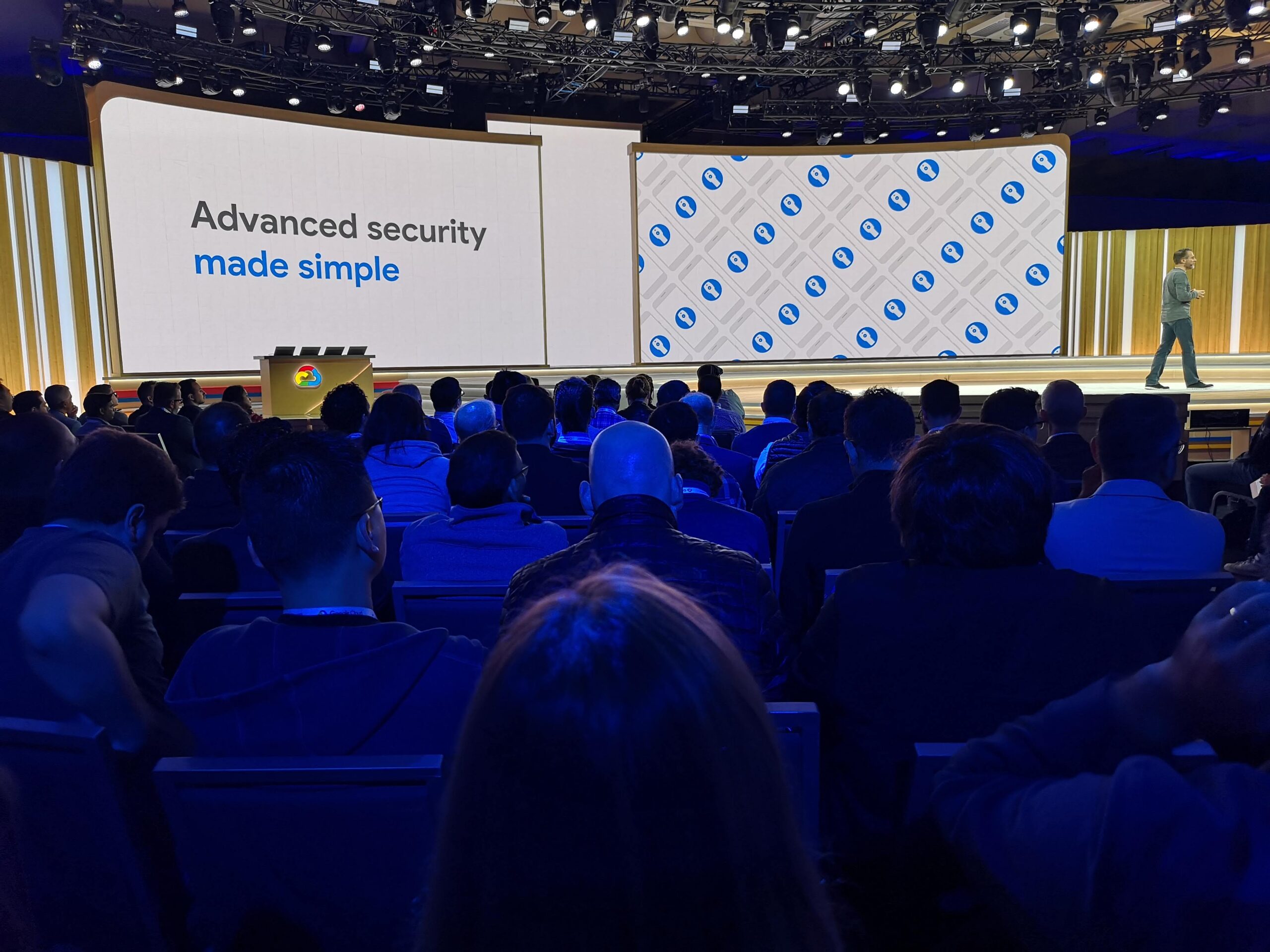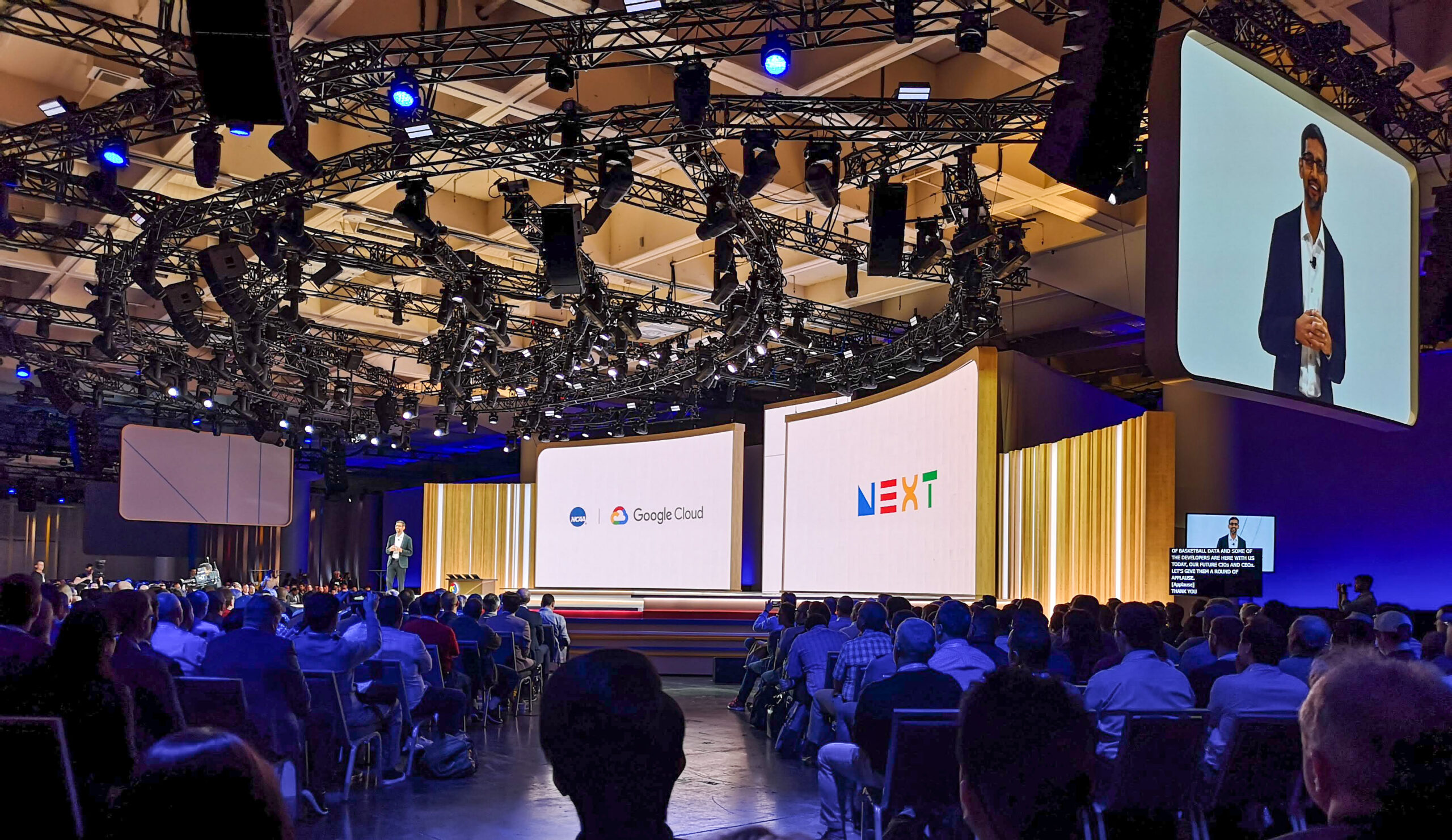
122+ announcements. That’s the impressive amount of new exciting Cloud technologies Google released last week at this year’s edition of the unmissable Cloud event Google Cloud Next in San Francisco. Our team was in San Francisco to hear about these Cloud innovations at first hand during the keynotes and sessions at Next. We’re super excited to implement these at our customers.
Curious to hear what’s new? Let’s get you up to speed with an overview of Google Cloud announcements at Google Next ’19!
An enterprise-ready Cloud
For starters, let’s consider the amount of new announcements made. 122+ is an impressive number, knowing Google worked on these in the last 9 months only. Yes, it hasn’t even been a year since the previous new technology announcements Google made at Next 2018! The newly announced innovations span the domains of infrastructure, app development, big data, analytics, cloud for marketing, artificial intelligence, machine learning, productivity, digital workplace & much more.
 In the meantime, quite a lot has changed at Google Cloud internally, as former CEO Diane Greene “left the building” to make room for brand new CEO Thomas Kurian, former president of product Development at Oracle. He’s planning on expanding Google Cloud’s sales force, accelerating growth and gaining more big interprises as customers – competing more aggressively in the Cloud market.
In the meantime, quite a lot has changed at Google Cloud internally, as former CEO Diane Greene “left the building” to make room for brand new CEO Thomas Kurian, former president of product Development at Oracle. He’s planning on expanding Google Cloud’s sales force, accelerating growth and gaining more big interprises as customers – competing more aggressively in the Cloud market.
Every customer I’ve met is glad to have such incredible technical expertise at their disposal, and we’re committed to substantially expanding the scale of our go-to-market teams in order to help more customers use our technology.” – Thomas Kurian, CEO Google Cloud
This all proves one thing: Google is heavily investing in Google Cloud, and is more than ever enterprise-ready. While Google Cloud is still in a challenger position compared to the other 2 large Cloud providers Amazon and Microsoft, it’s certainly growing at a fast pace. New big Google Cloud enterprise customers in 2019 like Colgate-Palmolive, Unilever, National Geographic, IKEA, Whirlpool & UPS only confirm this.
Recap of announcements
Here we go for an overview of what is new in Google Cloud this year. In the coming weeks, we’ll dive deeper in several of these topics in more detailed blog posts written by team members who attended the keynotes and sessions.
A hybrid & enhanced Google Cloud Platform
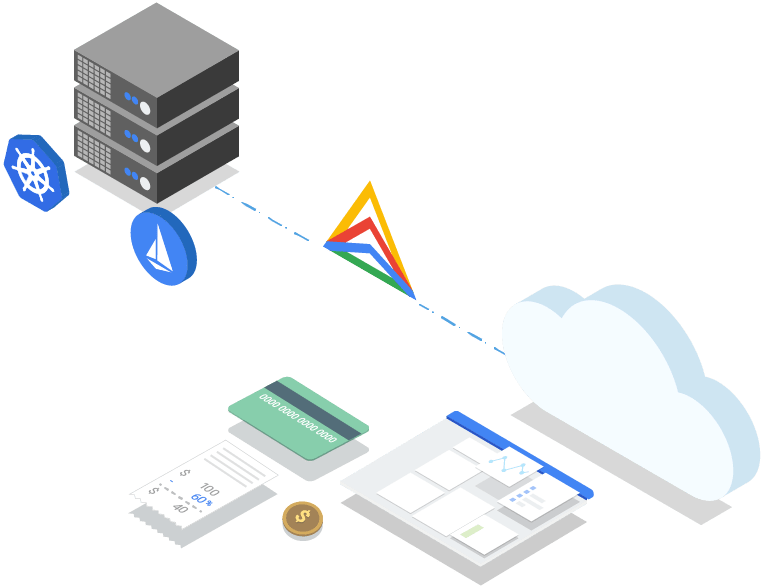
One of the major announcements at Next ’19 is without a doubt Anthos: the renamed Cloud Services Platform that is now generally available on Google Kubernetes Engine (GKE) & GKE On-Prem. With Anthos you can deploy, run & manage your applications on-premise or in the Cloud. More importantly, soon you’ll be able to do the same for third party Cloud providers like AWS and Azure, right there in Anthos.
With this capability, Google is fully embracing the multi-Cloud strategy of a lot of enterprises. Enhancing a hybrid or multi- Cloud with Anthos and other new technologies like Cloud SQL for Microsoft SQL Server or Managed Service for Microsoft Active Directory, these new capabilities are now definitely a differentiator for enterprises to choose for Google Cloud. See below for more details on this exciting new stuff, that will save many of us a lot of time.

Simply put, I believe that Anthos is the future of Cloud. – Urs Hölzle, Senior Vice President Technical Infrastructure Google Cloud
Here’s what else is new for Google Cloud Platform:
- Related to Anthos are the introduction of Anthos Migrate, powered by Velostrata’s migration technology and Anthos Config Management which lets you create multi-cluster policies out of the box.
- Google announced two new Google Cloud regions for its global infrastructure: one in Seoul, South Korea and one in Salt Lake City, Utah, USA. With these extra regions, the total number of global regions will rise to 23 in 2020.
Serverless
- Cloud Run: fully managed serverless execution environment with serverless agility for containerised apps. With Cloud Run on GKE you can experience the same with your GKE cluster.
- Knative: a Kubernetes-based platform to build, deploy & manage modern serverless workloads.
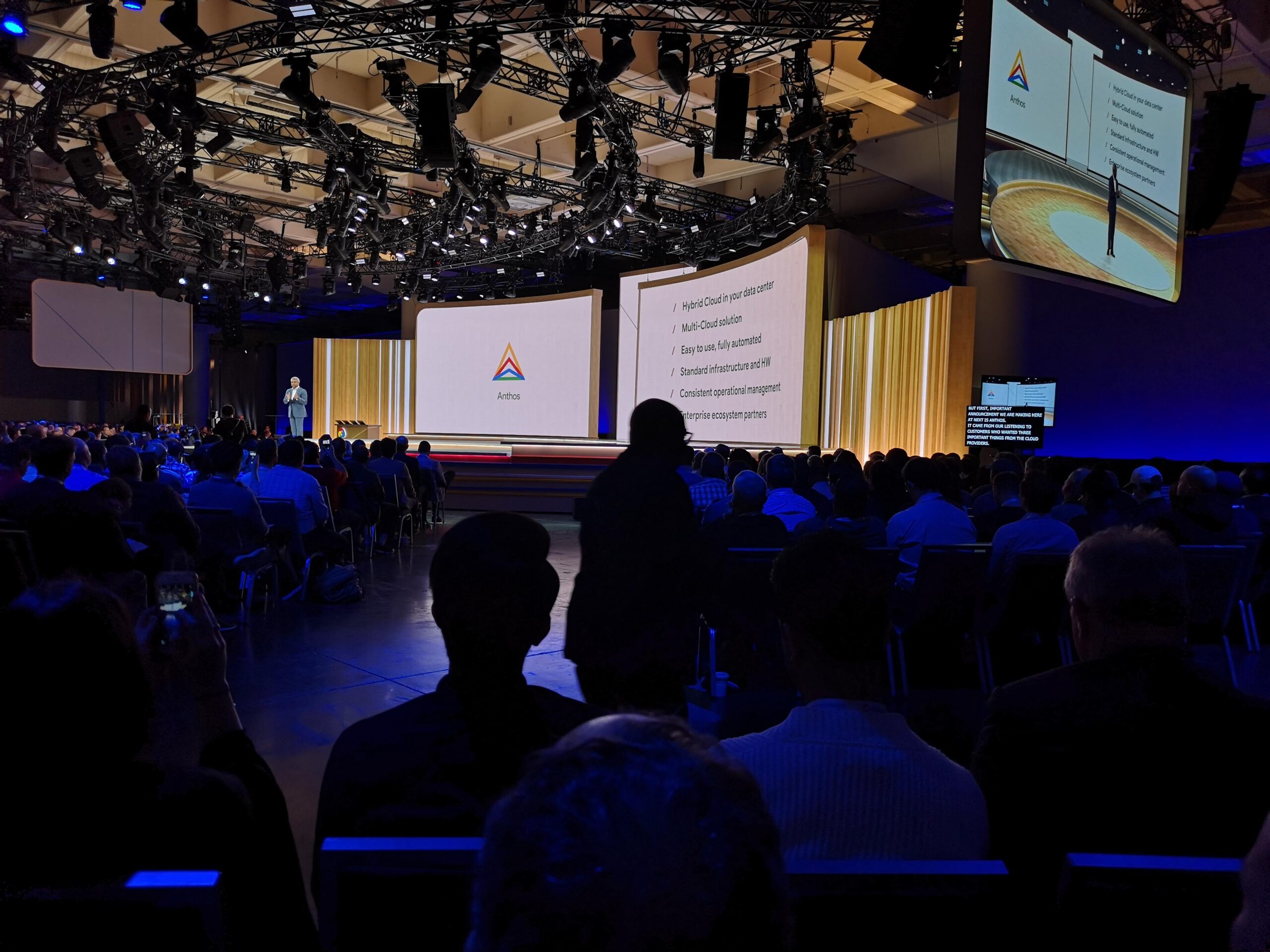
- The new Cloud Code: tools to help you write, deploy and debug cloud-native apps quickly & easily. Extensions to IDEs such as Visual Studio Code and IntelliJ to rapidly iterate, debug & deploy code to Kubernetes.
Managing your APIs
- Apigee hybrid: gives you the power to choose where to host API traffic — on-premises, cloud, multi-cloud, or hybrid. (beta)
- Apigee security reporting: get visibility into the security status of your APIs. (beta)
- Apigee API Management platform: directly access a variety of Google Cloud services like Cloud Functions, Cloud Data Loss Prevention, Cloud ML Engine & BigQuery.
Networking
- Traffic Director: enterprise-ready traffic management for open service mesh, allows you to deploy application instances in multiple Google Cloud regions. (beta)
- High Availability VPN: connect your on-premises deployment to GCP Virtual Private Cloud (VPC) with an industry-leading SLA of 99.99% service availability at general availability. (soon in beta)
- 100 Gbps Cloud Interconnect: connect your hybrid & multi-cloud deployments.
- Private Google Access from on-premises to the cloud: securely use Google services like Cloud Storage & BigQuery as well as third-party SaaS through Cloud Interconnect or VPN. (generally available)
- Network Service Tiers: optimise your network for performance or cost by selecting Premium or Standard Tier.
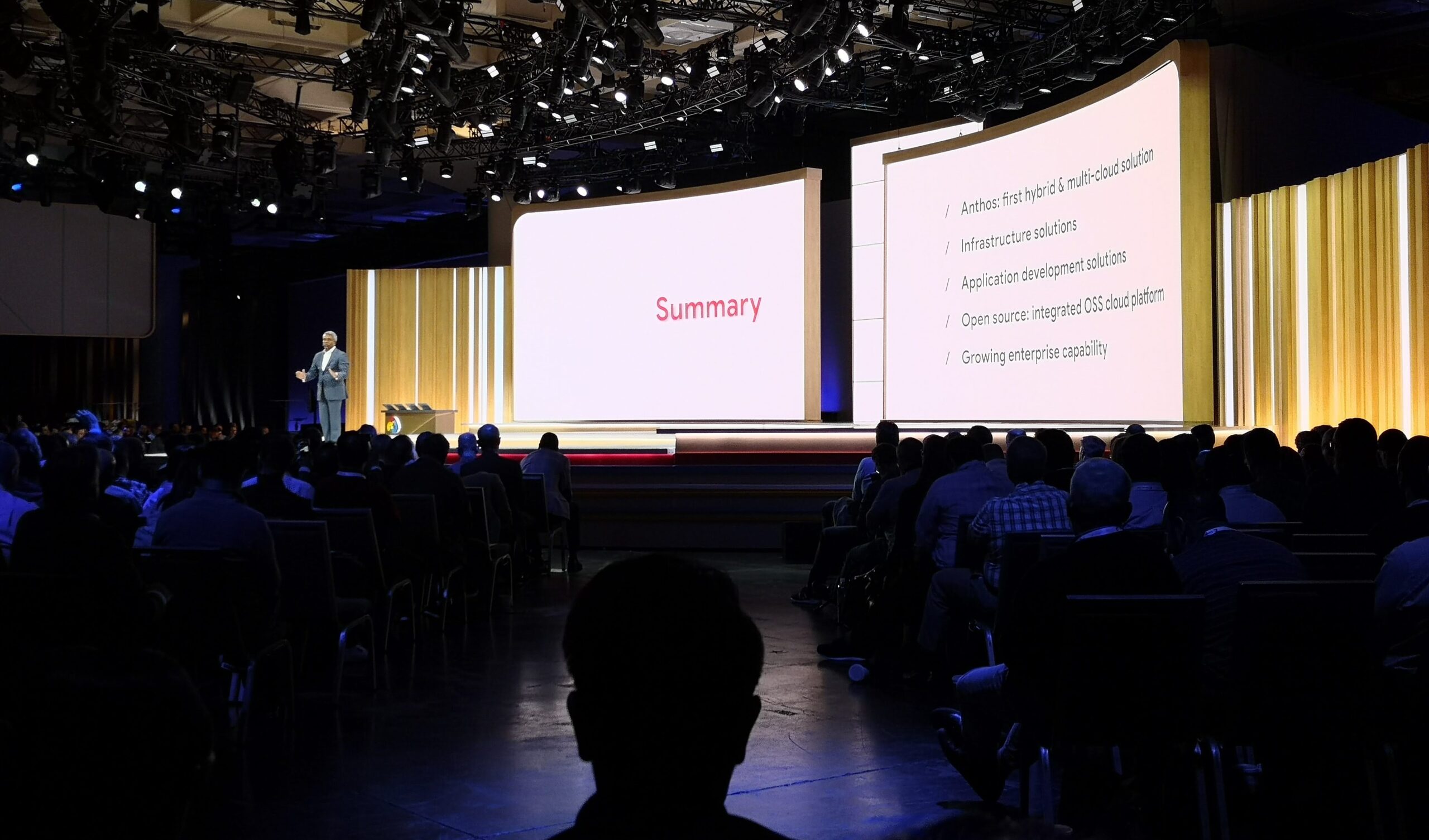
Windows workloads on Google Cloud Platform
- You can now bring your existing Microsoft licenses to GCP, next to purchasing on-demand licenses from Google Cloud.
- You’ll soon be able to specifically tag Microsoft workloads that require sole tenancy and apply existing licenses automatically with Velostrata 4.2, Google’s streaming migration tool.
- You’ll be able to use Managed Service for Microsoft Active Directory (AD), a highly available, hardened Google Cloud service running actual Microsoft AD, to:
- manage your cloud-based AD-dependent workloads
- automate AD server maintenance and security configuration
- extend your on-premises AD domain to the cloud (coming soon)
- Cloud SQL expansion: Google’s fully managed relational database server will support Microsoft SQL Server. Also the brand new Anthos will be extended for hybrid deployments to Microsoft environments.
Manage & store your data better
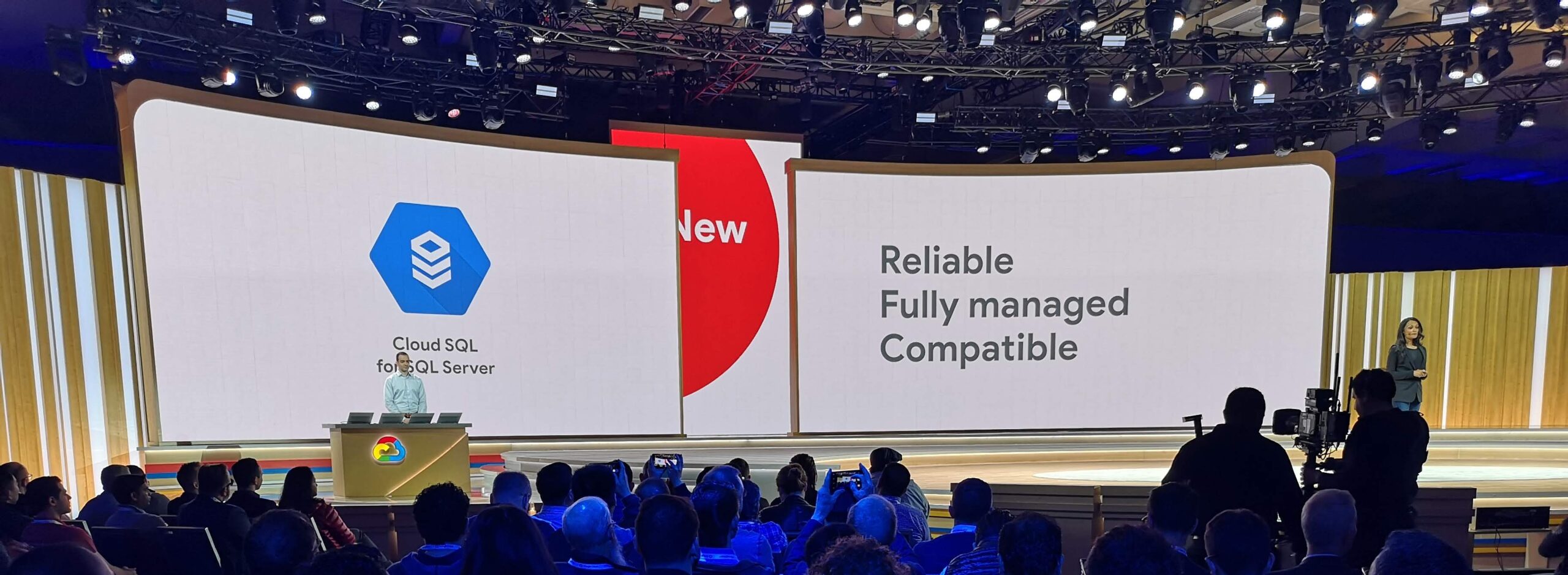
Google again shows its commitment to giving you the choice in how you run your enterprise workloads. Google Cloud is making it easier and more straightforward to manage, move and access your data when you need it. In that view, the introduction of the ability to bring your existing SQL Server workloads to GCP and run them in a fully managed database service (coming soon) is great. Also, great announcements that are part of this improved SQL management:
- Cloud SQL for Microsoft SQL Server; again Google Cloud’s embrace to hybrid Cloud is coming forward here
- CloudSQL for PostgreSQL, now with version 11 support and useful new features
- Cloud Bigtable multi-region replication (now available)
Other improvements for your data management & storage are these:
- New low-cost archive class for Cloud Storage
- Cloud Filestore: Google made its fully managed file storage system now also available for high performance storage needs.
- Regional Persistent Disks: active-active disk replication across two zones in the same region. (coming very soon)
- Bucket Policy Only: uniformly control access to your Cloud Storage resources. (beta)
- V4 signatures: improved security and access to multiple object stores using the same application code. (beta)
- Cloud IAM roles: now available for Transfer Service. Allows security & IT administrators to use Cloud IAM permissions for creating, reading, updating, and deleting transfer jobs.
Supercharged data Analytics
For an overview of what’s new in Data Analytics, see the article of our data engineer Charles Verleyen here.
More innovation in AI & ML
Google’s cutting edge AI & ML technologies got upgraded as well. See the article of our data engineer Charles Verleyen here.
Digital Workplace & G Suite Enhancements

Digital transformation starts at the digital workplace, and enhanced G Suite & Chrome Enterprise features further enable organisations to build and improve such a digital workplace. The new capabilities spark more real-time collaboration and aim to make your workforce even more productive, using Google’s powerful AI & ML technologies.
Also in G Suite, Google is proving its enterprise-readiness once more. Take Google Voice, for example, that gives businesses a phone number and enables even better communications with employees and customers wherever, whenever. Or the Microsoft Office editing in Google Docs, Sheets and Slides; which will make it easier for enterprises to work with external or internal Microsoft Office users.
Here’s what new in G Suite & Chrome Enterprise:
New functionalities for G Suite
- Google Assistant now integrates with Google Calendar: this integration will help you know when and where your next meeting is and keep up with scheduling changes. (beta)
- Connected sheets: this new kind of spreadsheet combines the simplicity of a spreadsheet interface with the power of BigQuery.
- G Suite Add-ons: you’ll get easier access to favourite workplace apps in the G Suite side panel. (soon in beta)
- Hangouts Meet video conferencing updates:
- automatic live captions (generally available)
- make live streams “public” (coming soon)
- up to 250 people can join a single meeting (coming soon)
- Google Voice for G Suite: gives businesses a phone number that works from anywhere, on any device. Google Voice can also transcribe voicemails & block spam calls by making use of Google AI technology. (generally available)
- Third-party Cloud Search: helps employees search digital assets and people in their company. (generally available for eligible customers)
- Drive metadata: enables G Suite admins to create metadata categories & taxonomies to make content more discoverable in search. (beta)

- Hangouts Chat into Gmail: access your team communications in one place on your desktop—the lower left section of Gmail which also highlights people, rooms, and bots. (beta)
- Office editing in Google Docs, Sheets and Slides: this is a major announcement in terms of compatibility with external or internal users using another office suite. With this feature, you can work on Microsoft Office files straight from G Suite without having to worry about conversion issues. (generally available)
- Visitor sharing in Google Drive: easily invite others outside of your organisation to collaborate on files in G Suite using pincodes. (beta)
- Currents (the new name for the enterprise version of Google+): lets your employees share ideas and engage with others across your organisation. (beta)
- Access Transparency: this allows you to get visibility into data that’s accessed by Google Cloud employees for support purposes. (generally available for G Suite Enterprise customers)
- Data regions enhancements: data regions now provide enhanced coverage for backups.
Chrome Enterprise
- Chrome Browser Cloud Management within the Google Admin console: manage browsers in your Windows, Mac and Linux environments from only one location.
A safer & more controllable Cloud for everyone
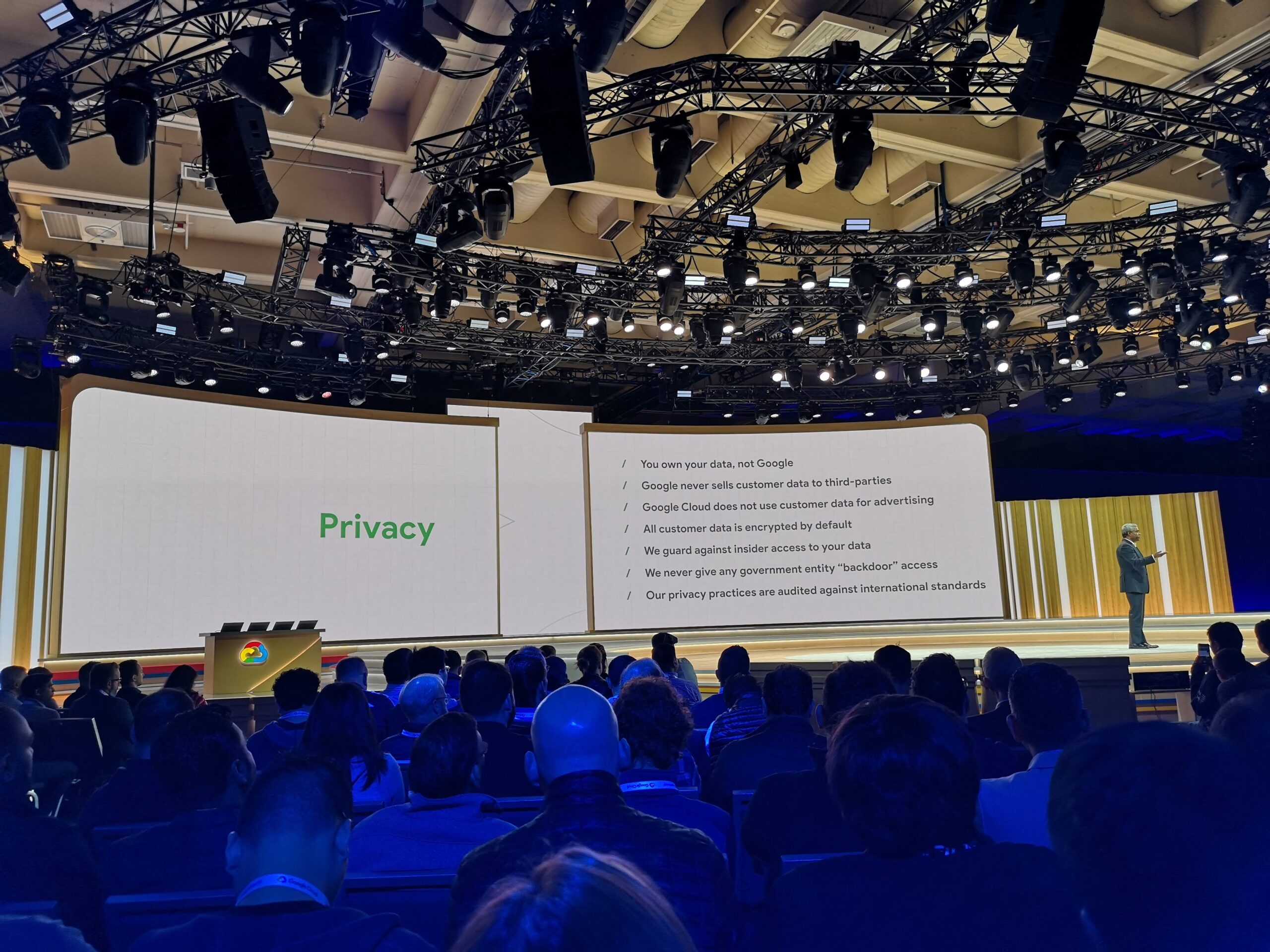
Security is not a matter of luxury, but always a real necessity and ‘sine qua non’ for Google. Although often thought of differently, security is a real differentiator and a main reason why companies move to Google Cloud. Your data is probably nowhere safer than in Google’s Cloud, with its multilayered security and privacy measures. Also on this domain as well as in the field of identity and access management, there are several updates done this year.
Your data is your data” – Thomas Kurian, CEO Google Cloud
Security
- Access Approval: get more transparency through near real-time logs when Google administrators interact with your data. It’s a first to market product available in beta for every Google Cloud Platform customer. (beta)
- Data Loss Prevention (DLP) user interface: easily run DLP scans. There is no code necessary, and no hardware or VMs you have to manage. (beta)
- Virtual Private Cloud (VPC) Service Controls: define security perimeters for sensitive data in Google Cloud Platform services around Google Cloud Platform resources such as Cloud Storage buckets, Bigtable instances, and BigQuery datasets. This helps you to constrain data within a VPC and mitigate data exfiltration risks. (generally available)
- Cloud Security Command Center: with visibility into what assets are in Google Cloud Platform and their security state; Cloud Security Command Center makes it easier for you to prevent, detect, and respond to threats. (generally available)
- Event Threat Detection in Cloud Security Command Center: quickly detect damaging threats such as malware, crypto mining, and outgoing DDoS attacks by using Google’s proprietary intelligence models. (beta program)
- Security Health Analytics in Cloud Security Command Center: helps surfacing configuration issues with public storage buckets, open firewall ports, stale encryption keys, deactivated security logging, and more. (alpha program)
- Cloud Security Scanner: detect vulnerabilities like cross-site-scripting (XSS), clear-text passwords & outdated libraries in your GCP apps. Displays results in Cloud Cloud Security Command Center. (generally available for App Engine & beta for GKE & Compute Engine)
- Security partner integrations: integrate with security partners to respond quicker and unite findings. Partners available at GCP Marketplace include Capsule8, Cavirin, Chef, McAfee, Redlock, Stackrox, Tenable.io & Twistlock.
- Stackdriver Incident Response and Management in Cloud Security Command Center: respond to threats and remediate findings.(coming soon to beta)
- Container Registry vulnerability scanning: get vulnerability information and other types of metadata for container images in Container Registry before you deploy your containers. (generally available)
- Binary Authorization: deploy only containers you trust on Google Kubernetes Engine. (generally available)
- GKE Sandbox: increase the security for your GKE containers. (beta)
- Managed SSL Certificates for GKE: full lifecycle management (provisioning, deployment, renewal & deletion) of your GKE ingress certificates. (beta)
- Shielded VMs: virtual machines (VMs) on Google Cloud Platform hardened by a set of security controls that help defend against rootkits & bootkits. (generally available)
- Policy Intelligence: understand & manage your policies to reduce your risk. Increase the security without increasing the workload. (alpha)
- Phishing Protection: protect your users from phishing sites. (beta)
- reCAPTCHA Enterprise: protect your website from fraudulent activity, spam & abuse. (beta)
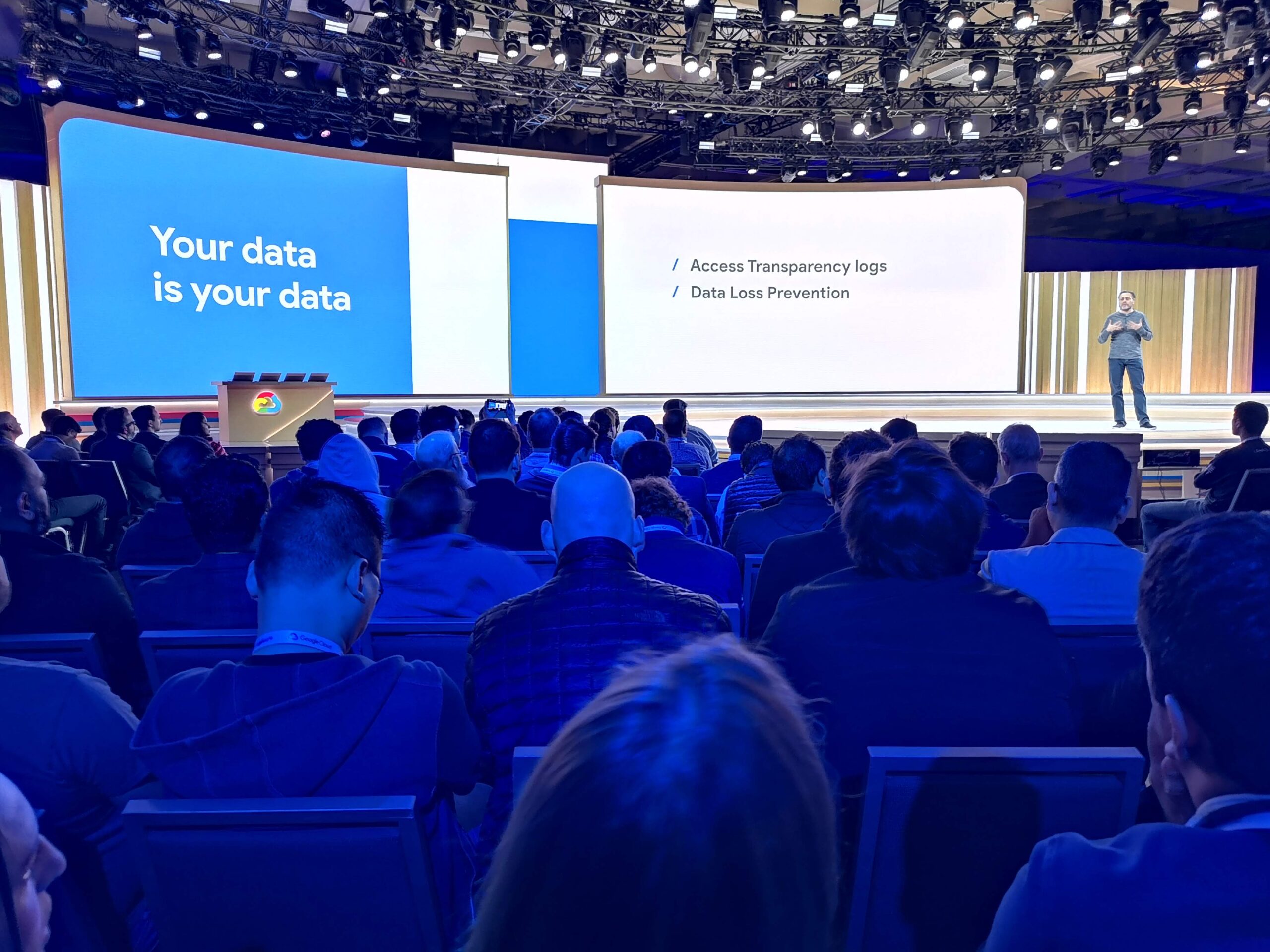
Identity & access management
- Android phone’s built-in security key: Google brings the ultimate account security to your phone. The best defense against phishing is now available in your pocket!
- Context-aware access improvements: a.o. the start of the BeyondCorp Alliance helps you to define & enforce granular access to apps and infrastructure based on a user’s identity and the context of their request. (beta)
- Cloud Identity improvements: a.o. single sign-on to thousands of additional apps & integration with human resource management systems.
- General availability of Identity Platform: add identity management functionalities to your own apps and services.
That’s it for this year’s announcements at Google Cloud Next San Francisco. We’re already looking forward to the next Google Cloud Next edition, a bit clos
